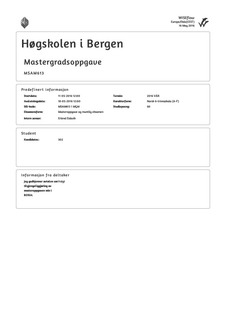«Come to Nepal and make a difference!» Volontørturisme i Nepal
Master thesis
Permanent lenke
http://hdl.handle.net/11250/2481538Utgivelsesdato
2016-05-18Metadata
Vis full innførselSamlinger
Sammendrag
Denne masteroppgåva set søkjelys på det stadig meir utbreidde globale sosiale fenomenet volontørturisme («volunteer tourism»). Dette er ein kvalitativ studie, basert på to månadar med feltarbeid i Nepal hausten 2015. Gjennom intervju, deltakande observasjon og feltsamtalar, fekk eg kome nær inn på feltet eg har undersøkt. Datamaterialet frå feltarbeid i Nepal er drøfta i lys av tidlegare forsking. Den overordna problemstillinga i denne oppgåva lyder som følgjer: Kvifor reiser folk frå Vesten til Nepal for å vere volontørar? Feltarbeidet avslørte at vestlege volontørar var motivert av ulike faktorar, og at volontørane si forståing av eiga rolle, samt volontørane si forståing av nepalarar, kan vere med på å forklare det sosiale fenomenet. Følgjande underproblemstillingar er difor relevante: Kva motivasjonsfaktorar ligg til grunn for å arbeide som frivillig i Nepal? I kva grad kan volontørane si forståinga av eiga rolle bidra til å forklare at dei reiser til Nepal? I kva grad kan volontørane si forståinga av nepalarar bidra til å forklare at dei reiser til Nepal? Studien viser at årsakene til at folk frå Vesten reiser til Nepal for å arbeide som frivillig er komplekse og samansette. Både strukturelle forklaringar og individuelle motivasjonsfaktorar kan forklare volontørturismen i Nepal. Altruistiske, egoistiske og religiøse motivasjonsfaktorar stod fram som sentrale i mine data. Fleire av informantane i mitt utval viste til religiøse motivasjonsfaktorar som viktige, eit funn som kom noko overraskande. Utbreiinga av religiøse motivasjonar blant volontørane, viser at frivillig arbeid og religiøse motiv går hand i hand i Nepal. Denne studien viser at det religiøse aspektet er relevant for å forstå volontørturismen i Nepal, og at denne dimensjonen kan vere relevant også for framtidige analysar av fenomenet volontørturisme. Av strukturelle forklaringar på volontørturisme i Nepal, trekk denne oppgåva fram synet på «oss» og «dei andre» som sentrale. Volontørturismen i Nepal kan forståast på bakgrunn av volontørane si forståing av eiga rolle, samt volontørane si forståinga av nepalarar. Synet på eiga rolle som nokon som skal «hjelpe» nokon som er «hjelpetrengande», er grunnleggjande forståingar som ligg til grunn for volontørturisme i Nepal. Volontørane sine ynsker om å hjelpe Nepal, kan sjåast i samanheng med fattigdommen i landet og det øydeleggande jordskjelvet som ramma landet i april 2015. Nepal har blitt ein populær arena for volontørturisme, ein alternativ turisme som kan kategoriserast i krysninga mellom bistand og turisme. This master’s thesis sheds light on the constantly more prevalent global social phenomenon known as volunteer tourism. This is a qualitative study, based on two months of field work in Nepal in the autumn of 2015. Through interviews, participating observation and field conversations, I was able to research my chosen field closely. The material resulting from the fieldwork in Nepal, is discussed in perspective of previous research. The main research question in this thesis is as follows: Why do people from the West travel to Nepal as volunteer tourists? The field work revealed that Western volunteer tourists were motivated by different factors, and that the volunteer’s understanding of their own role, as well as their understanding of the Nepali people, may be part of explaining the social phenomenon. The following subordinated research questions are therefore relevant: What motivational factors drives people to work as volunteers in Nepal? To what extent is the volunteers’ understanding of their own role contributing to explain their choice to travel to Nepal? To what extent is the volunteers’ understanding of the Nepali people contributing to explain their choice to travel to Nepal? This study shows that the reasons why Western people travel to Nepal to work as volunteers are complex and compound. Both structural explanations and individual motivational factors can explain the volunteer tourism in Nepal. Altruistic, egoistical and religious motivational factors stood out as essential in my data. Several of the informants in my selection pointed at religious motivational factors as important, a finding that was rather surprising. The expansion of religious motivational factors among the volunteers shows that volunteer work and religious motives go hand in hand in Nepal. This study shows that the religious aspect is relevant to understanding volunteer tourism in Nepal, and that this dimension may be relevant for future analysis of the volunteer tourism phenomenon as well. Among structural explanations of volunteer tourism in Nepal, this thesis emphasizes the view of “us” and “the others” as central. The volunteer tourism in Nepal may be understood based on the volunteers’ understanding of their own role, as well as the volunteers’ understanding of the Nepali people. The view of one’s role as someone who will “help” someone “in need of help” is an essential understanding behind volunteer tourism in Nepal. The volunteers’ wish to help Nepal, can be viewed in coherence with the country’s poverty and the destructive earthquake that afflicted the country in April, 2015. Nepal has become a popular arena for volunteer tourism, an alternative tourism that can be categorized in the intersection between aid and tourism.
Beskrivelse
Masteroppgave i samfunnsfagdidaktikk

